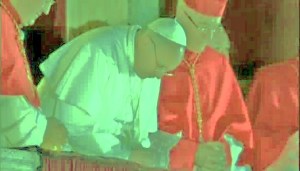“Few will have the greatness to bend history itself; but each of us can work to change a small portion of events, and in the total; of all those acts will be written the history of this generation.” (Robert Kennedy)
Sentiments about the Catholic Church run the extremes. Believers find solace in its promise of eternal salvation. Detractors say that it is old-fashioned and out-of-touch, that it does not understand the changes in the lives of individuals and families in this fast-paced and technologically advanced age. The skeptical view has also translated into other important measures pertinent to an organization that relies largely on the generosity of its faithful.
The membership of the Catholic Church have been on a decline for decades. For the exception of Islam, which holds the most number of members worldwide, other faiths are closing the gap at astounding rates. Through messages that inspire and speak to an individual’s deepest concerns, more evangelic faiths are successfully attracting and retaining a new generation of religious followers. Fortunately, only a few months after he ascended to the papacy, it appears the tide may be changing for the 2000-plus year old church.
It was a rain-swept day at the Holy See, where the spiritual and administrative nerve-center of a 1.8 billion strong religion spread out across the globe sits. It was by the fifth ballot when the white smoke from the chimney finally spewed its much awaited message of hope announcing a newly elected leader. The pomp and circumstance became the attraction for some time until he stepped onto the balcony, as other popes before him did, greeted by boisterous and adoring crowds. To them he spoke and bowed in thanks and impressed upon the faithful worldwide that he was unlike any of his predecessors.
Within hours of his ascendancy he reiterated what became his lifelong mission of assisting the poor. In later sermons he intoned the time-honored tradition of administering to the needy, but amended what had been the Vatican’s mantra and cautioned that the church should not speak of theology alone.
The surprise of his papacy arrived in a comment placating the non-believers from eternal damnation if they performed a lifetime of good works. Traditional Catholic teachings emphasized the acceptance of God and Jesus Christ as the prerequisites to heavenly salvation and not the deeds they’ve accumulated in life. One of the dogmas that remained problematic was the teaching known to have existed since the moment God had communicated with the mortals. It was believed that passage through the pearly gates of heaven could only be attained through acceptance of the Heavenly Father and his Son, even at the last hour of a person’s life. For many, that seemed arbitrary and unfair – particularly for those who lived a decent and socially responsible life but did not believe in God.
Somehow there was something different about his ascendance that said to me change was in the offing. As a member of the Jesuit Order, he was bound by oath never to hold religious office, a solemn requirement to insure their obedience to the church. But the Jesuits have a strong binding inclination towards radical change. It is their very nature. Considered “God’s Marines” for their tireless missionary works around the world, they were also scientists with telescopes and instruments that demonstrated their advanced understanding of the natural world. Many kings and emperors sought their advise on matters of the state, and arranged for their offspring’s to receive instructions in a variety of subjects – manifesting their ethos of a supremely competent teaching order.
Their skills in navigating centers of power and influence in the early years, earned them esteem among the ruling and wealthy elite and begrudging respect from enemies. Their influence and power had grown considerably, it was the subject of revulsion among the clergy, requiring the sentence of punishment to be dispensed by the pope himself. In 1773 the Jesuit Order was banned completely by their own church for controversies amounting to the usurpation of the church’s authority. Many sovereign states soon followed as a predicate to confiscate their vast tracts of land and other valuable holdings. It wasn’t until 1814 when the suppression order was reversed by the church.
As evidenced by the stunning growth immediately following the censure reversal, the Jesuit Order demonstrated adaptive abilities not only to cultures and countries that hosted them, but also significant challenges in every sphere of church affairs. Twenty-two of the twenty-eight Jesuit institutions of higher learning established in America happened in the 19th century. It is that character that so heartily seeks change and learning that is their most important asset. It is an invaluable quality that will hold them in good stead as they bring the church into the 21st century.
An organization cannot affect change unless it has been so experienced in relevant terms. The Jesuit’s 472 years of existence offers an abundance of collective experience burnished by trials and tribulations of every magnitude through the centuries. That disposition of a learned and experienced assemblage of Men of the Cloth is critically needed to bring the transformations and reforms being sought by the new pope.
Recent conversations I had with people of different religions gave me an interesting view on the apparent contradiction. For centuries many other religions criticized the Roman Catholic Church for its unyielding position towards non-Catholics, but most especially the non-believers. Repeating what the Pope said met with disbelief and repudiation by the other faithful. One simply said that the pope is wrong. In an amazing turn-around, the Catholic church took a position of inclusiveness, giving non-believers a way to achieve salvation and a place among the other believers in heaven. They took a contrarian stance towards a group of people traditionally persecuted by all the monotheistic religions.
What a fascinating turn of events.

Discussion
No comments yet.